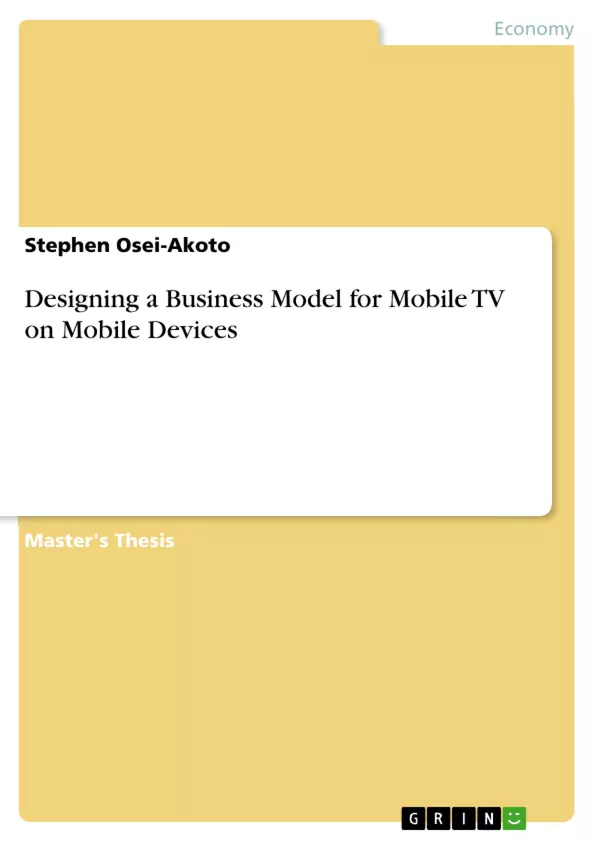The author studied the business model that will be suitable for deploying Mobile TV as a service to the user/customer, the market players and the providers involved in rolling out such as service. The research which was carried out in this project included finding a suitable business model to drive this service and also looking at the various technologies that is backing the mobile TV service.
In order to know what pertains in Ghana and that of the outside world, the author conducted a small survey to seek the views of future and present customers of this service. Their responses were not too different from what have been reported by other surveys and analysts. During the project there was evidence that the operators and providers will need clearly defined roles in order for each member to be committed to the project and also to sustain the service. Despite the challenges outlined by experts in the industry, there is light at the end of the tunnel for Mobile TV service which is yet to be seen. The Europeans, the Americans and the Asians have already taken lead in this service and are constantly researching to make the service affordable, available, and interactive as possible and innovated than the traditional TV.
Inhaltsverzeichnis (Table of Contents)
- Chapter One - General Introduction
- Introduction
- Background on Business Model and Technology
- Motivation
- Problem Definition
- Objectives of the Project
- Problems
- Pricing Scheme
- The choice of technology
- Coordination of Stakeholders
- Formulation of root definitions of relevant Business Models
- Guiding questions
- Scope of Work
- Methodology
- Structure of the Project Report
- Chapter Two - Literature Review
- Literature Review
- Chapter Three - Overview of Technologies
- Introduction
- Mobile TV Service Delivery Platform
- Mobile Broadband Platform
- Broadcast Mobile TV Technologies
- Comparison of Mobile TV Technologies
- Services and Content
- Chapter Four - Survey Results
- Data Collection and Analysis
- End-User Requirements & Expectations
- Chapter Five - Business Models for ICT
- Introduction
- The importance of business models
- Subscription Business Models
- Advertising Business Models
- Hybrid Business Models
- Designing the Business model for Mobile TV
- Chapter Six - Findings and Recommendations
- Introduction
- Main regulatory models
- Business model- Challenges and Issues
- Observations
Zielsetzung und Themenschwerpunkte (Objectives and Key Themes)
This project aims to investigate and design a profitable business model for delivering Mobile TV services to users, considering the market players and providers involved. The research includes exploring suitable business models to drive this service and examining the underlying technologies.
- The feasibility and design of a profitable business model for Mobile TV services
- The technologies enabling Mobile TV service delivery
- User requirements and expectations for Mobile TV services
- The role of various stakeholders in Mobile TV service implementation
- Challenges and opportunities associated with the Mobile TV industry
Zusammenfassung der Kapitel (Chapter Summaries)
Chapter One provides an introduction to the project, outlining its motivation, problem definition, objectives, and methodology. It also discusses the scope of work and the structure of the report.
Chapter Two presents a literature review, exploring existing research and publications related to Mobile TV services and business models.
Chapter Three focuses on the technologies involved in Mobile TV service delivery, covering mobile TV service delivery platforms, mobile broadband platforms, broadcast mobile TV technologies, and a comparison of these technologies. It also explores the various services and content offerings associated with Mobile TV.
Chapter Four summarizes the results of a survey conducted to understand the requirements and expectations of potential Mobile TV users.
Chapter Five examines various business models used in the ICT industry, particularly subscription, advertising, and hybrid models. It also discusses the process of designing a business model for Mobile TV services.
Chapter Six presents the findings and recommendations of the project, highlighting challenges and issues faced by Mobile TV service providers, and outlining key observations and insights gained from the research.
Schlüsselwörter (Keywords)
This research focuses on Mobile TV, business models, technology, user requirements, stakeholders, regulatory models, challenges, and opportunities. It also explores key concepts such as Mobile TV service delivery platforms, mobile broadband platforms, broadcast mobile TV technologies, and subscription, advertising, and hybrid business models.
Frequently Asked Questions
What is the primary objective of this project on Mobile TV?
The project aims to design a suitable and profitable business model for deploying Mobile TV services, considering the needs of customers, market players, and service providers.
Which technologies are enabling Mobile TV service delivery?
The research examines various technologies, including Mobile TV service delivery platforms, mobile broadband platforms, and broadcast mobile TV technologies.
What business models are discussed for the ICT industry?
The paper explores subscription business models, advertising business models, and hybrid models that combine different revenue streams.
What were the findings of the survey conducted in Ghana?
The survey sought the views of future and present customers, finding that their expectations for affordability and interactivity align with global trends reported by analysts.
What are the main challenges in implementing Mobile TV services?
Key challenges include establishing effective pricing schemes, choosing the right technology, and ensuring the coordination of various stakeholders and regulatory models.
How does Mobile TV compare to traditional TV?
Mobile TV is designed to be more interactive and available on the go, with constant research aimed at making it more innovative than traditional television broadcasting.
- Citation du texte
- Stephen Osei-Akoto (Auteur), 2010, Designing a Business Model for Mobile TV on Mobile Devices, Munich, GRIN Verlag, https://www.grin.com/document/187978



